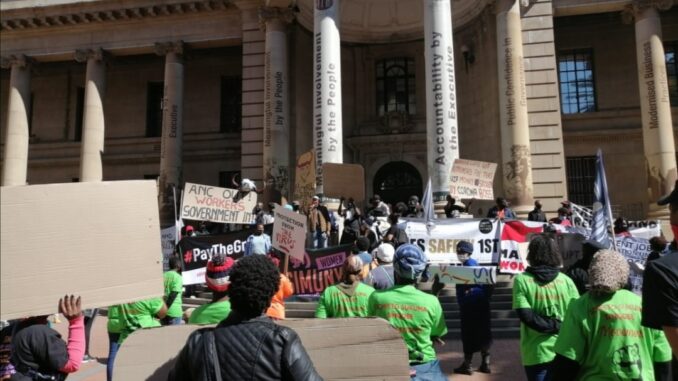
Angela Chukunzira
Angela Chukunzira is an activist from Kenya. She is currently a student based at the Centre for Social Change, University of Johannesburg.
On 1 August, South Africa had its most widespread, co-ordinated protest since the end of apartheid. The country now has the fifth highest number of total, new and active cases of Covid-19, and the demonstrations occurred with infections still rising at an exponential rate.
On 26 March 2020, the South African government enforced a lockdown that only allowed essential services to operate as a way of containing the spread of the virus. This meant that the majority of the workers remained at home and daily survival became difficult. The adults who have no other source of income were guaranteed a R350 (about $20) monthly relief grant, which is barely enough to push through a whole month. For some the grant is yet to be disbursed. This, coupled with the increasing injustices that have been experienced during lockdown, resulted in the Working-Class Day of Action.
The activities that took place on the 1st were partly co-ordinated by the C-19 Peoples’ Coalition. It is a conglomeration of community structures, trade unions, social movements including contemporary movements like Extinction Rebellion, non-governmental organisations, faith-based organisations among others that was formed to ensure that the principles of social justice are upheld during the pandemic. South Africa is the most unequal country in the world with a soaring rate of unemployment. It is estimated that 3 million people lost their jobs at the start of the lockdown and that the unemployment rate is now about 50%.
The unique nature of the protests that took place on the 1 August was that they were decentralised, occurring in more than 40 different locations, partly because of the restrictions in movement. With the lockdown regulations, large gatherings above 50 people are regarded as illegal. There are also diverse increasing local demands at the moment. Rural farmers, community health workers, teachers and casual workers among others joined their forces and participated in local actions that took place in that day. This was seen by actions in different provinces from across the country ranging from Women against Gender Based Violence, to land occupations in urban areas.
This decentralisation had already been exemplified before in two notable actions that took place during the pandemic and allowed for local issues being prioritised. The first was on 16 June, a day that is marked in South Africa in remembrance of the Soweto Uprisings of 1976 and 18 July, which marked Mandela Day.
The Community Organising Working Group (COWG), an affiliate of the C-19 People’s Coalition had initiated popular education and food distribution across about 20 communities that had begun at the beginning of the lockdown period. This has been done in Gauteng, the province that includes Johannesburg and constitutes more than a quarter of the country’s population. It was pushed by the help of volunteers in various informal settlements by encouraging people in communities to keep safe and prevent the spread of the virus by wearing masks, observing physical distance and handwashing. The 16 June was remarkable in that the actions were taking place simultaneously and there was a moment of silence observed across communities as a reflection of the struggles that took place in 1976 and linking them to the struggles of today. On the 18 July 2020, Mandela Day, the actions took place in a similar fashion. This involved volunteering and popular education initiatives that were conducted simultaneously across the communities.
The actions of 1 August also saw a culmination of localised issues being prioritised. They ranged from land occupations to the demand for protection of the frontline workers. In Protea South, an informal settlement bordering Soweto, the mobilisation and actions were done around the issues of schools re-opening. This involved teachers and the members of the community who occupied the roads leading to Protea South primary school and Almont secondary school. They demanded, as the infection rate is spreading, for the schools to remain closed to protect the safety of the community rather than focusing on the loss of an academic year. On the other hand in Nigel, south-east of Johannesburg, there was a demand to protect the shop workers who are regarded as frontline workers. This was done by a demonstration that took place outside a hypermarket, which had cases of discrimination of workers based on race and some of the workers were underpaid. In Eldorado Park, a community based to the south of Soweto, there was land occupation and planting of vegetable gardens that was as a response to the increasing hunger that communities have been exposed to. These are just but a few examples of what was happening nationally in both urban and rural areas.
The largest demonstration of the day took place outside the Gauteng Legislature in the Johannesburg Central Business District. This was led by the Casual Workers Advice Office (CWAO) and the Simunye Workers Forum. This saw about 250 people involved outside the legislature. Among the demands made were for the Universal Basic Income Grant, an end to the police repression and Gender Based Violence. When police tried to stop the demonstration, the organisers countered the repression and observed physical distancing, a good adaptation and example for current protests.
Missing in action however were most of the trade unions, though leading trade unionists associated with the Workers’ Right group of the C-19 Peoples’ Coalition were present.
These important actions succeeded in highlighting the impact of the pandemic, especially on the working-class whose already deplorable conditions situation have been greatly worsened.

1 Trackback / Pingback